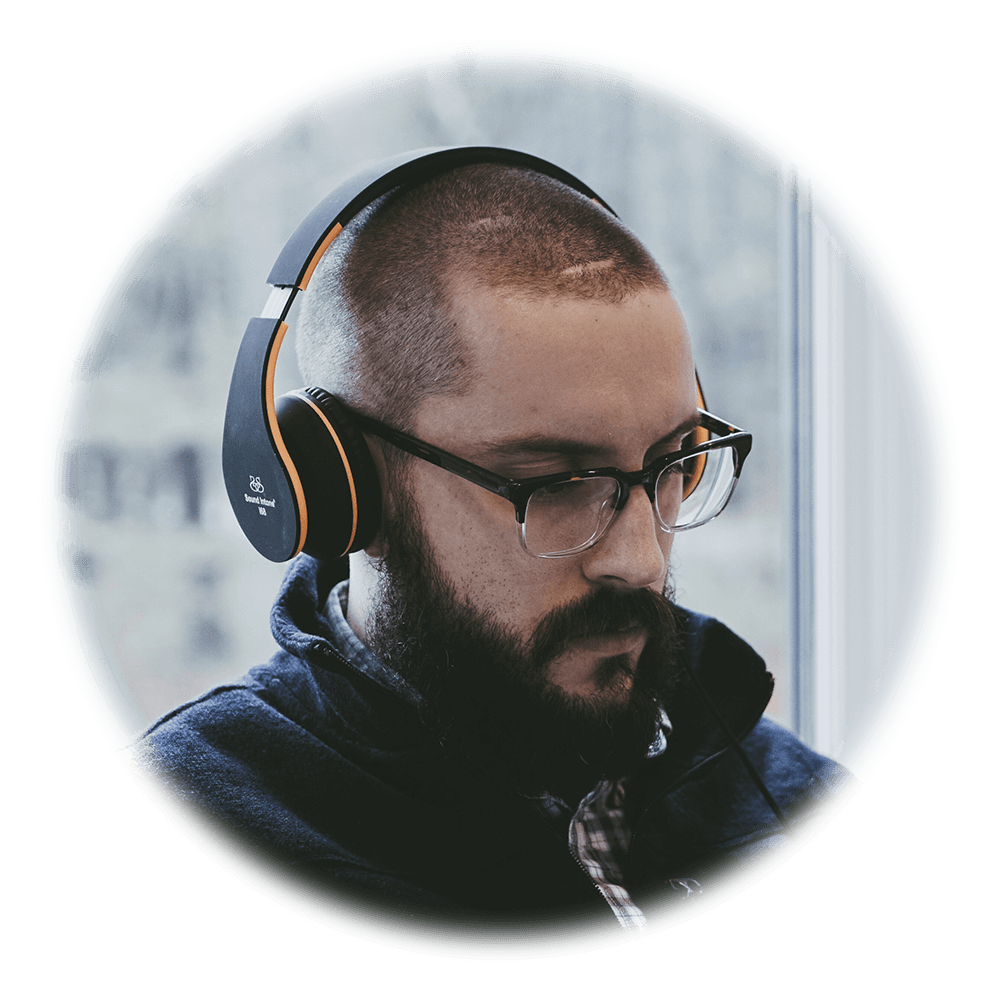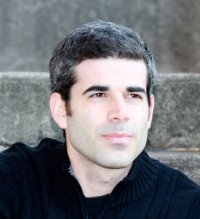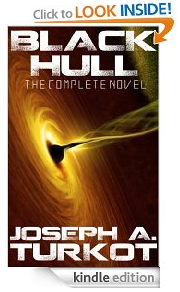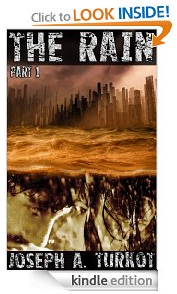There are a few truths about life that echo themselves loudly in the world of writing.
#1 – You learn best from others.
#2 – There is power in numbers.
When I decided 8 months ago that I was going to pursue fiction full-time and use this blog as a stepping stool – I knew that I wanted to connect with as many other authors as possible. I had this wild idea that if I could interview as many authors as I could reach, then maybe some of their greatness/inspiration would rub off and I might learn a thing or two.
Turns out I was right.
See what I mean in the first of a brand new blogging series:
Interviews With Authors #1 – Joseph Turkot
Today’s interview features realistic fiction, science fiction, horror, and fantasy author Joseph Turkot. I first ran across Joseph and his work on the writer’s forum Kboards.com. I immediately picked up the complete novel version of his sci-fi series Black Hull and absolutely loved it. If you enjoy politically charged sci-fi, then I highly recommend this book.
I contacted Joseph for an interview shortly thereafter and he was gracious enough with his time to play along. Here was what he said:
What inspired you to write and self publish your first book?
I’ve always had a supercharged imagination and loved the escape that stories bring. When I was younger, I surrounded myself with stories. Movies, books, video games, you name it. I knew from a very young age that I wanted to make my own stories. It wasn’t until a couple years ago that I even knew self-publishing existed. I thought I had to go through the painful process of querying agents or there’d be no money in writing. Once I found the online community of self-publishing authors, I started to soak in everything I could. Since then, I’ve grown more and more inspired to keep on writing, and when time permits, market the books I write.
What books have most influenced your life?
This is such a loaded question. Different books have made deep impressions on me throughout my life. It changes as you grow up. One of the earliest I can remember is A Wrinkle in Time. I really loved that one. And then later on, The Lord of the Rings. I fell in love with dystopian literature too, like 1984. I also loved Michael Chrichton’s books (Jurassic Park, Congo, Sphere). Today, I practically only read non-fiction survival stories. My favorite is Endurance by Alfred Lansing.
If you had to choose, which writer would you consider a mentor/inspiration?
John Keats, Michael Chrichton, J.R.R. Tolkien, George Orwell. Hell, even George Lucas counts.
Are there any new authors that have grasped your interest?
Not really because I don’t really read new authors. Like I said, I mainly search out survival non-fiction that I haven’t read. That’s the only thing, almost, that I’m interested in right now. If you know of one you think I haven’t read, please let me know about it!
Are you a full-time writer?
No.
What else are you doing?
I teach high school English full-time. It’s a great job that keeps me entrenched in literature. It forces me to continue to learn and grow as a writer and a reader.
Do you remember the first thing that you ever wrote?
Probably a choose-your-own-adventure story in the vein of the stories I used to read as a kid. Also, a story where people die off one by one in a jungle, a la Predator.
How do you decide what to write about?
I usually feel a premise hit me. I like to change between genres frequently to keep things fresh. I also know that fans depend on the author finishing what they start, so I’m mindful of that too. For example, the story I’m writing now, and publishing serially, came with the premise of rain starting—and never stopping. I was fresh off of playing The Last of Us, a great video game. And the idea of writing something in that post-apocalyptic setting is something I’ve always wanted to do. I love Oryx and Crake, and I thought The Road was pretty good too. So I took the premise and my feelings about those other works and tried to make something original. Of course, having just driven across the country (7,000 miles) helped inspire some great locations for me to use.
Is there anything you find particularly challenging in your own writing?
Just the consistency piece. I’ve been a lot better lately than I used to be. Since I’ve started to see actual progress and sales, I find it a lot easier to be consistent now. Still, I can hit lulls where I don’t write for a week or two because I’m in between an episode of a serial. I try to challenge myself in other ways too—for example, in the current story The Rain (mike says: get it, it’s free), I’m using first-person present tense for the first time. It’s definitely tricky at first. Slipping in and out of past tense without losing the reader. But it’s a lot of fun too. And I think it sharpens me as a writer.
Are you a plotter or a panster?
I can plot. I can panst. It depends on the story and the feeling I have. For example, with the current book I’m writing, I will write out a 15k word episode based on some bullet point list I created. But I don’t refer to the list. I just write it out at some point to play the story further in my head so I have a rough idea of what’s going to happen. But I always leave the door open for something very unexpected to occur. That’s part of the fun. I’ve heard it said that if you don’t enjoy writing what you’re writing, then no one will enjoy reading it. I find that’s true. So I can’t plot too specifically or I’ll lose the joy of spontaneity that I love.
What is your writing routine?
Force myself to write. Forcing the act to happen. If I can at least get started, I know I’m good for a couple thousand words at least. It’s the whole act of sitting down and loading up the Word document. Sometimes I get really motivated to write, and I know it will be easy to sit down. Other days it’s harder, but I can still make a decision to get going. At least for a little bit. And I always feel better when I’ve written at least a little. There are no particular times, but it’s mostly at night right now since I’m working full-time. With summers off as a teacher, I can write during the daytime which is nice.
How many words do you write per day?
Usually I write a minimum of 2,000. Sometimes it’s more, and sometimes it’s less. But during the summer, when I was writing Neighborhood Watch, I set 2k as a rule. And I’d always end up going over anyway.
Do you have your books professionally edited?
No. Haven’t done this yet. It’s crossed my mind, and I see that some of my stories might benefit from this, but I haven’t been able to bring myself to do this yet. So far I just do a minimum of three passes over my stories, revising and then editing.
Who designed your cover(s)?
I do all my own covers. I find stock photos and use photoshop to work some magic. I’ve been doing alright so far. No major complaints with the covers. I am a pretty good artist, so I think it lends itself a little bit to the design piece.
Do you have a marketing plan or are you more a “shoot from the hip” type of author/marketer?
Keep writing. And that’s just what I’ve taken in from other successful writers. As long as I keep writing, I’ll continue to build my digital shelf space. Of course, having an internet presence helps. And buying ads once in a while helps. And having permanently free books (that aren’t standalone novels) helps. I use KBoards Café as my information station for all things marketing. And so far, it’s really made a difference.
What is one thing that you think has contributed the most towards your book sales?
Shifting genres. My first series was fantasy and it didn’t sell so well right out of the gate. Mind you, I don’t sell super well as it is, at least compared to many other indies out there (I just broke 500 sales in a month for the first time ever last month). When I wrote my first horror short story, it really started to sell well. I’ve realized that switching things up can create some very good, and unexpected, consequences.
Anything you plan on doing differently in the near future to increase book sales?
I just signed on for my second Bookbub advertisement. They seem to be the best ones out there right now. I am going to continue to market whenever I have time, and use a mailing list to notify readers about new releases. And those new releases, I plan to keep them coming. That means cutting back on video games and other things that are time sinks.
What advice would you give someone just starting out or considering going the self publishing route?
Do it. And join the KBoards Writer’s Cafe. Be a lurker if necessary. And—you have to really commit to it. I’m finding that success comes with making it a priority in your life. So, of course, you should also love every aspect of being an indie (writing, marketing, etc).
What current projects are you working on?
The Rain! This is a really cool post-apocalyptic story. It’s a young adult story, but I think it’s found an audience with adults too because of the mature content. It’s published in 70-80 page parts, and I’m about to publish part 4 later this week! Since it’s been out, it’s been doing pretty well. Also, part 1 is free! (marketing technique right there) Here’s the link: http://josephturkot.com/what-is-the-rain-a-post-apocalyptic-story/
Do you have any favorite self-publishing/writing blogs or training courses?
My first real source of inspiration was Lindsay Buroker. She’s over at www.lindsayburoker.com. Since then, as I’ve noted several times already, it’s primarily Writer’s Café. I don’t go anywhere else really.
Any other thoughts you would like to leave with readers?
If you’re one of the countless readers who have reached out to me about one of my stories, I’d like to say that you are, literally, the reason I’m writing as much as I am now. Without the encouragement and acknowledgement that what I’m writing is appreciated, I don’t know how motivated or inspired I’d currently be. I am a pretty lazy person at times who loves to procrastinate, so each e-mail or comment or review I get spurs me on. I can’t tell you how much. (Even the negative reviews I’ve grown to appreciate fully).
How can readers discover more about you and you work?
Website: http://www.josephturkot.com
Facebook: http://www.facebook.com/josephturkotwrites
Twitter: http://www.twitter.com/josephturkot
Amazon Author Page: http://www.amazon.com/Joseph-Turkot/e/B00A2BUJIA
Book Links: http://josephturkot.com/new-release-schedule/
Goodreads: https://www.goodreads.com/author/show/5312609.Joseph_A_Turkot
Would You Like To Be Featured As An Author/Editor/Publisher On MikeShreeve.com? All you have to do is contact me via Twitter @smmykal.
Mike’s Takeaways From The Interview
First, I want to say a HUGE thank you to Joseph for taking the time to answer those questions so fully and honestly and for being so open about his journey. I picked up a TON of golden nuggets and I hope, dear reader, that you have as well.
Here are my notes:
Joseph is taking the ole’ Stephen King working writer approach to his career and I love it. Even though full-time authorship is still just around the corner, he has made an opportunity for himself to be involved with words for a living still (as an English teacher). I love that idea. As someone who worked for 5 years a copywriter before making the transition to full time fiction, I can tell you that I easily had a headstart on others because of that fact. Work in the field, never give up on the dream, make adjustmesnt to make it happen.
I also really enjoyed the fact that Joseph hasn’t rutted himself into a single genre but seems to be writing to the series FIRST and the genre second. You may have head the saying, “Readers don’t fall in love with authors, they fall in love with characters”, it seems to me that writing to the series instead of wrapping yourself so tightly in a genre is exactly what authors should do to.
Along those same lines I was happy to hear that he doesn’t just read is a single genre all the time (or pure fiction all the time either). As a non-fiction obsessive I am always happy to hear of other fiction writers who read more than just novels.
I also picked up two important reminders about the writing lifestyle:
#1 – A real writer is someone who finishes their work, regardless of the style in which they finish it. I like Joseph’s attitude and his response to the question “Are you a panster or a plotter?” My impression of his answer was – “I am a get-it-doner.”
#2 – The incredible importance of rythm in the life of a writer. As he mentioned, the most success he had in completing work was when he was consistently writing 2k words per day. I can’t tell you how important it is to make sure you set daily minimums and complete them – every single day that you choose to write.
Wrap Up
I just want to say one final thank you to Joseph for his incredible interview and for the insights that he shared with us all.
Please subscribe to the MikeShreeve.com newsletter if you would like to receive the latest interviews, blog updates, contests and more.
[ois skin=”In Post Subscription”]
Additionally, please share this interview by clicking the “like” or “tweet” or whatever your social network of choice might be, below. The more we share the experiences, advice and work of our fellow authors the better we make the self-publishing space. And the better we make the self-pub space the more our potential readers will look to self-published authors to fill their reading needs!




